Start with Something – Following Picasso and Edelfelt
This week, we are using inspirational art as fuel for our own art. I show how I created my own version of Albert Edelfelt’s masterpiece by following the advice given by Pablo Picasso.
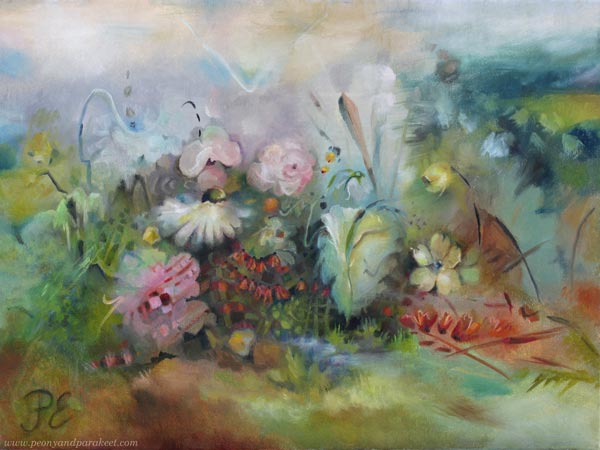
“Friends by Fate” is a small painting, but one of my favorites from the series that I made for the current exhibition. Because the title of the exhibition is Taiteilijat Edelfeltin tunnelmissa – Artists in the Mood of Edelfelt, I wanted to make my versions of some of Albert Edelfelt’s (1854-1905) artworks. For example, I made this one, and this one. “Friends by Fate” uses Albert Edelfelt’s painting “Women of Ruokolahti on the Church Hill” as inspiration.
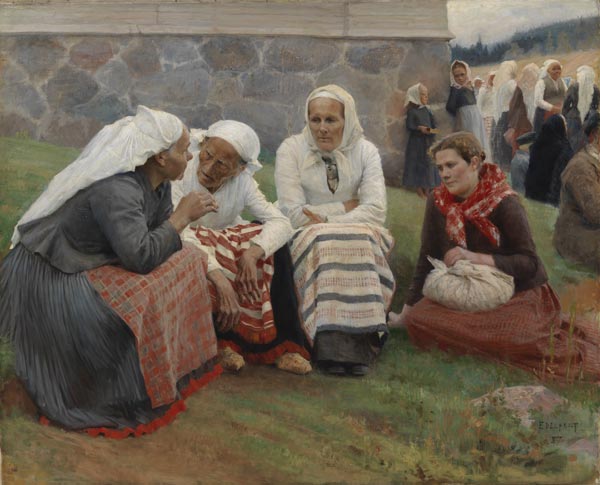
This is a very famous painting in Finland. Even if Albert Edelfelt painted a lot of portraits of wealthy people to finance his profession, he became known for pieces like this that depict ordinary folk.
Start with Something!
I have always been intrigued by this Pablo Picasso’s (1881-1973) quote:
“There is no abstract art. You must always start with something. Afterward, you can remove all traces of reality.”
In my opinion, this applies to any art, not just abstract. You can always start with something and then make your own version.
For example, even if there are people in Albert Edelfelt’s painting, it doesn’t mean that my version has to have them.
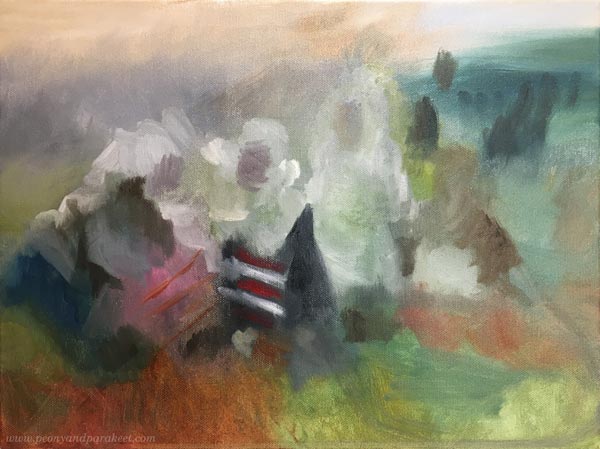
Start the painting with a similar composition, but then slowly let it grow in its own direction.
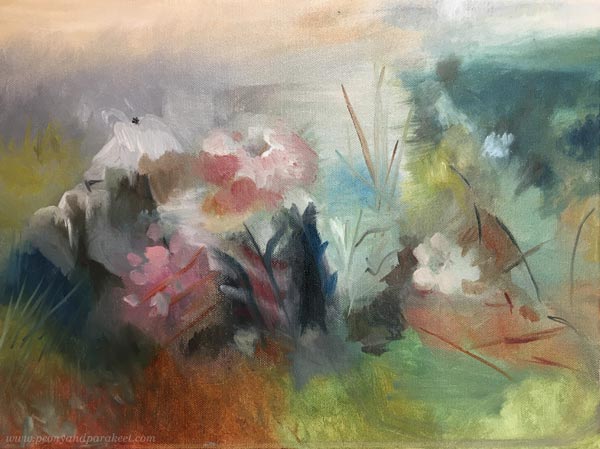
In my version, the flowers and plants replace the women, and the location is different too. I was thinking about the area where I live and how people gather together on a summer evening.
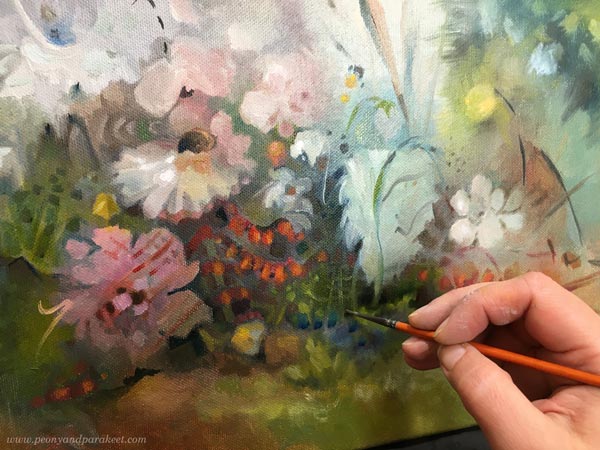
There was quite a lot of work in the details. Albert’s work is not clumsy, so I wanted mine to be well-finished too.
Following Picasso and Edelfelt
I love to paint so that flowers and plants are the characters of the painting. I feel I can combine my sense of humor with my yearning for beauty.
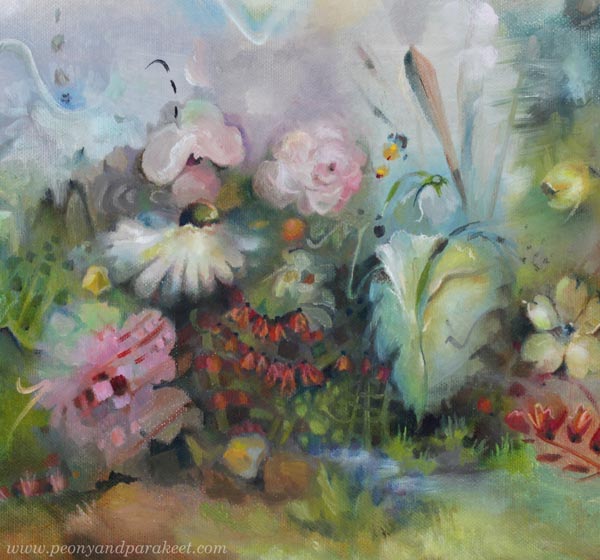
Flowers have given me a secret language that I can use to express anything. With this realization, I feel more and more drawn to the boldness of Pablo Picasso, the re-creator of Diego Velázquez’s 1656 masterpiece “Las Meninas”.
Others have seen what is and asked why. I have seen what could be and asked why not.
Albert Edelfelt was also appreciated in his lifetime, but he didn’t have the confidence that Picasso had. He wrote to his mother:
” I fear nothing else than that I become a raté – a half-talent and an unhappy person.”
(Free translation from Finnish)
This kind of seriousness is what I recognize too: puolilahjakkuus – half-talent – who would like to be that! But still – or maybe because of that, it’s good to embrace playfulness when creating art.
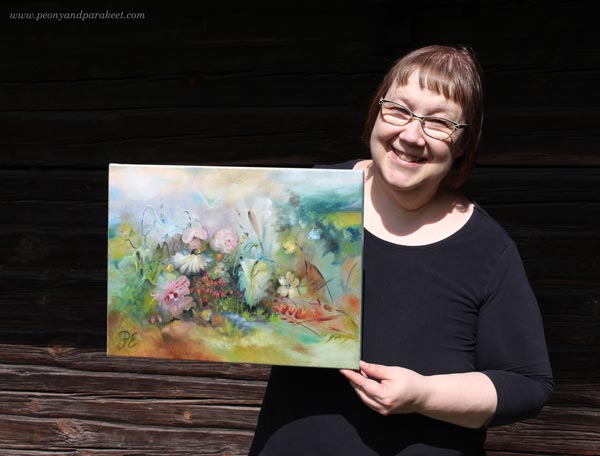
Like Edelfelt, you can recognize the fears and set the bar high.
But then, act like Picasso – Start with something and then ask: what could be and why not!
From Artist’s Focus to Artist’s Between
This week, I challenge you to question what the word “focus” means to you as an artist.
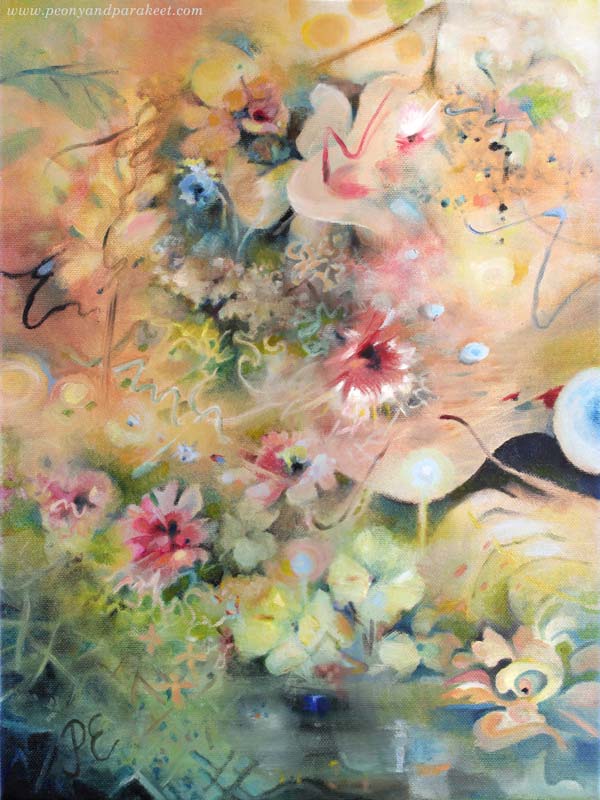
I thought a lot about the artist’s focus when painting this piece. This was one of the last paintings to be finished for my exhibition.
Artist’s Focus
Have you ever said this:
“I want to find my focus in art.”
Although I want to direct my energy wisely as an artist, something in that statement has always bothered me.
For me, the essence of art is not narrowing, but expanding – not isolating but inviting. The artist expresses not only herself but humanity in general. And as humans, we are rarely completely serene or focused. We seldom belong to only one group, one era, or one world. We are often one foot in one field, one foot in another.
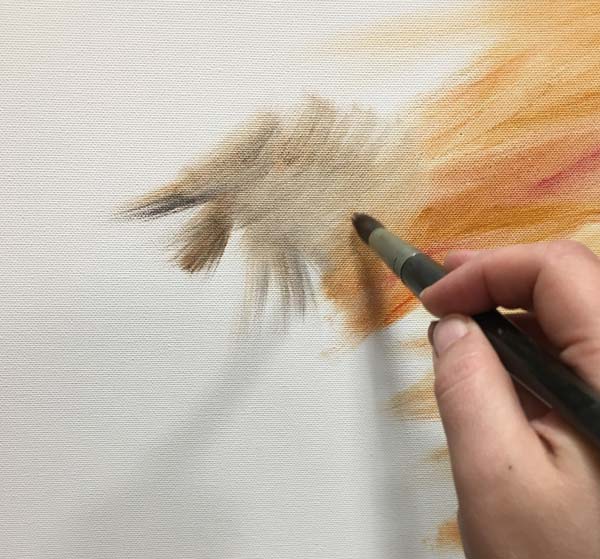
When we create, could the inspiring word be more like “between” than “focus?”
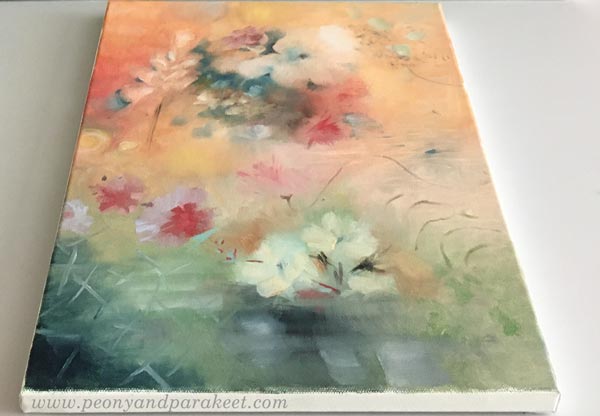
Focus is nice and pretty, but is it art?
Inspiration from Albert Edelfelt
In this series of paintings, my inspiration was the Finnish master painter Albert Edelfelt (1854-1905). For the painting of this post, I took ideas for the color scheme from this pastel work by Edelfelt. This piece is currently displayed at the Albert Edelfelt Exhibition in the Ateneum Art Museum in Helsinki.
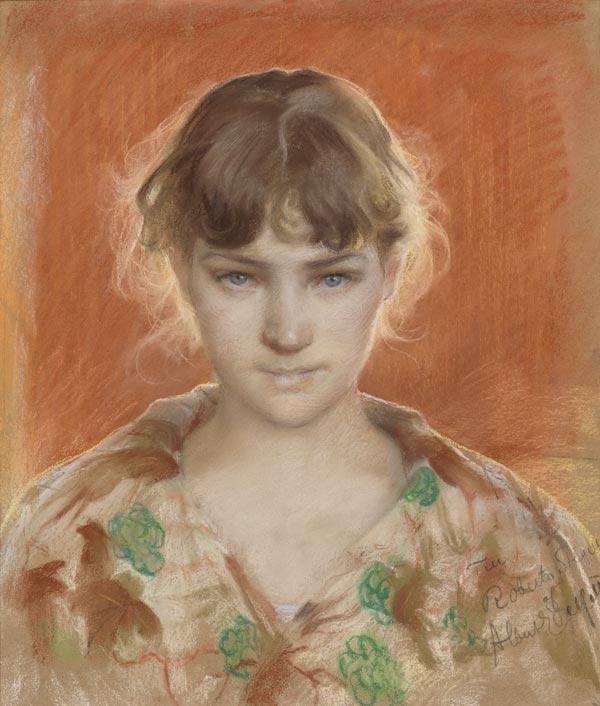
While studying the colors, I thought about the end of the 19th century and the intelligent look of the woman. Wasn’t this also “between” rather than “focus?” Between a man and a woman, if you think about the relationship between the model and Albert. Between being a model and having her own thoughts, if you study a woman’s gaze. Between representation and abstraction, if you observe lines and shapes.
Abstract art began shortly after Edelfelt’s death. He probably already felt its presence, felt that he was between two worlds.
From Artist’s Focus to Artist’s Between
I decided to throw myself fully into being between two worlds in this painting.
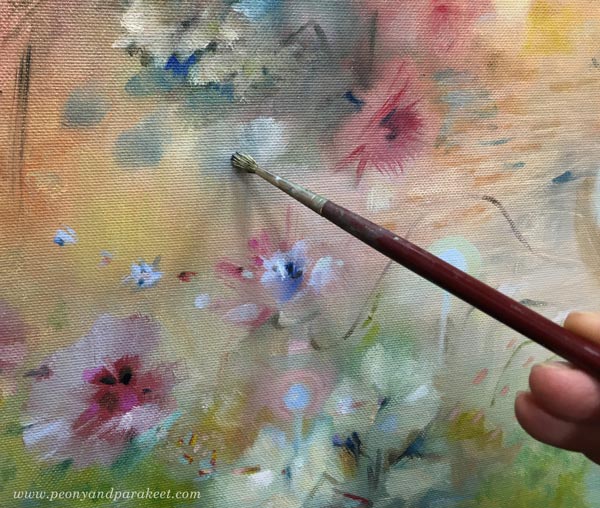
“Between” is an uncomfortable state of being, so this painting couldn’t contain only easy and beautiful. “Between” is a bit like walking in nature and then bumping into apartment buildings. Or when you’re admiring clear water in a pond and your eyes fall on the filters. Focus can then only exist if you close your eyes. Not very eye-opening, eh?
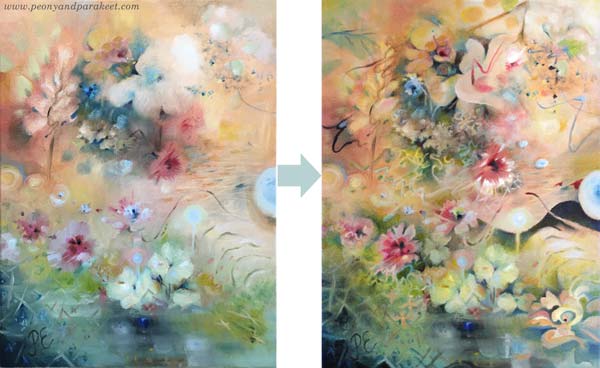
This painting has two different styles and although it is small in size, I feel that it reveals the secret between what I do and what I think.
I noticed at the opening of the exhibition that I don’t like to talk about this work, because I find it somehow intrusive. Often when the paintings are created, they are nice characters, a bit shy and sensitive, but fun company. This one is straightforward and doesn’t hide its contradiction.
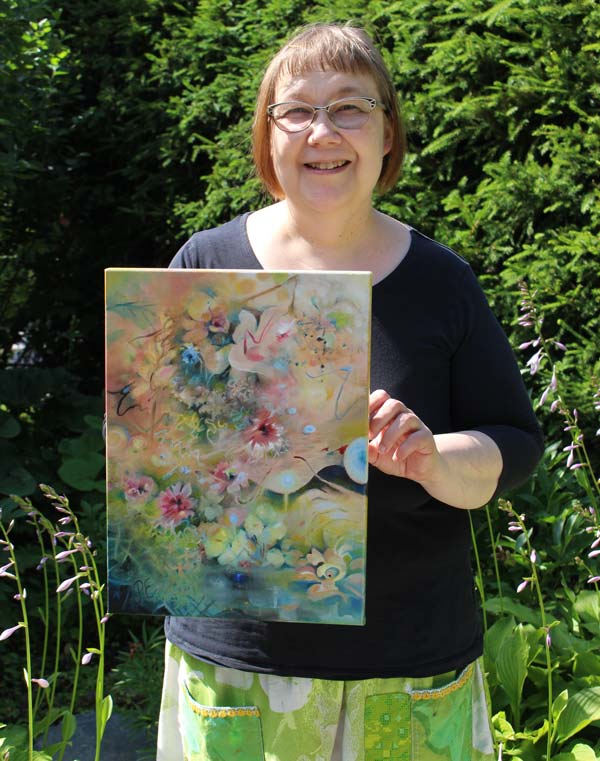
However, there is a lot of power in the contradictions and lack of focus. I want to continue to challenge myself to draw artistic inspiration from it.
Do you also feel that you are between two worlds?
In art-making, could you replace the yearning for “focus” with the embracing of “between?”
Art Exhibition in Villa Albert
This week, I have photos from the group exhibition I am currently participating. It’s called Taiteilijat Edelfeltin tunnelmissa – artists in the mood of Edelfelt. And here are four of us from left to right: photographer Niclas Warius, painters Kristina Elo and me, and another photographer Maarit Lehto. The sculptor Kaj Lindgård is also in the exhibition, but missing in the photo.
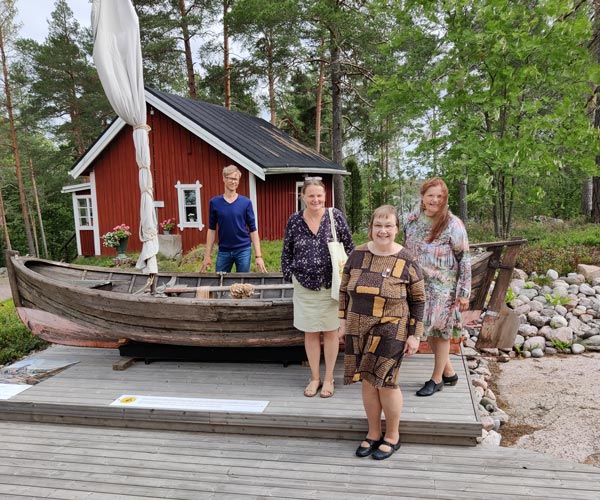
The red wooden cottage in the background is a summer studio of the famous Finnish painter Albert Edelfelt (1854-1905). It is in the possession of a private foundation Albert Edelfeltin säätiö that cherishes the memory of Edelfelt. Even if it’s just a small cottage, the location in Southern Finland is beautiful – near the sea and very near Porvoo, which is a small town popular with tourists.
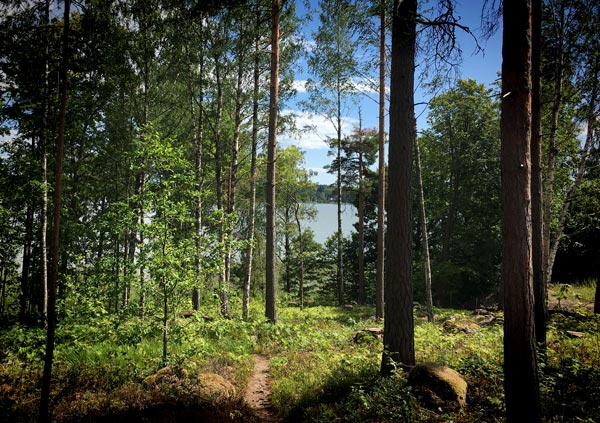
Albert Edelfelt painted here in summer and then went to France for winters.
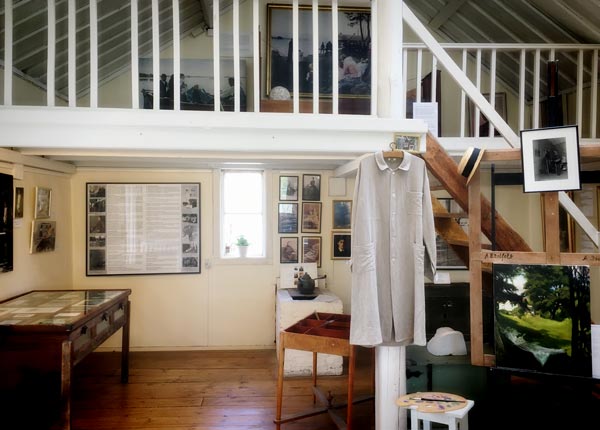
When you look at the studio from the sea, you can see the gallery Villa Albert behind it. The foundation built it in 2019.
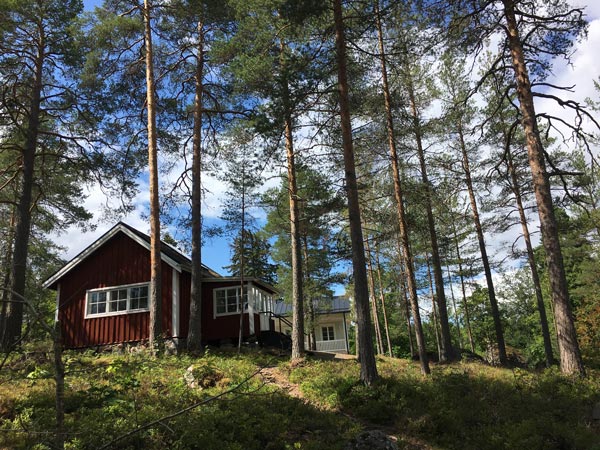
The gallery is a nice space with a small shop as well. All visitors who come to see Edelfelt’s studio, come first to the gallery to buy the tickets.
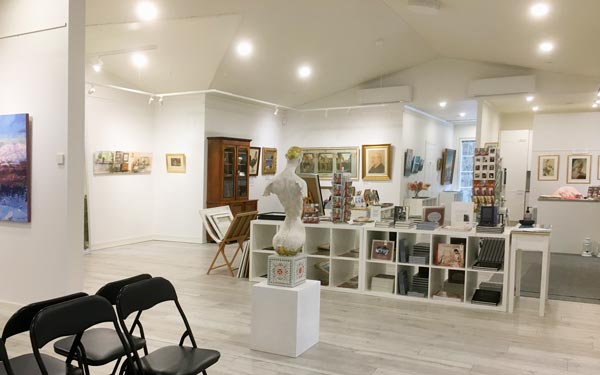
The head person of the gallery Hanna Kaarina Syrjäläinen is very skilled at hanging the exhibitions. I was so satisfied with how my paintings were displayed. Here an editor of a local magazine interviews me before the opening.
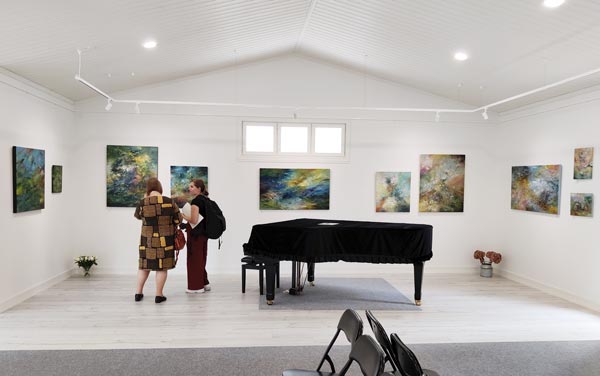
The foundation organizes concerts and other cultural events in the gallery. I think my paintings look great behind the grand piano!
I had 12 paintings in this space and four minis in a separate showcase.
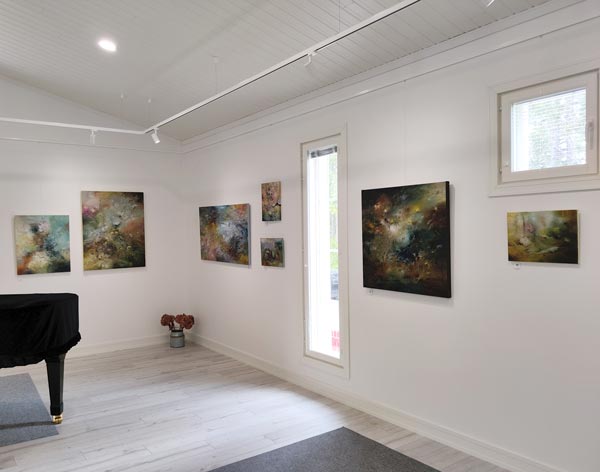
The gallery was full in the opening. The gallerist made a lovely speech about the exhibition.
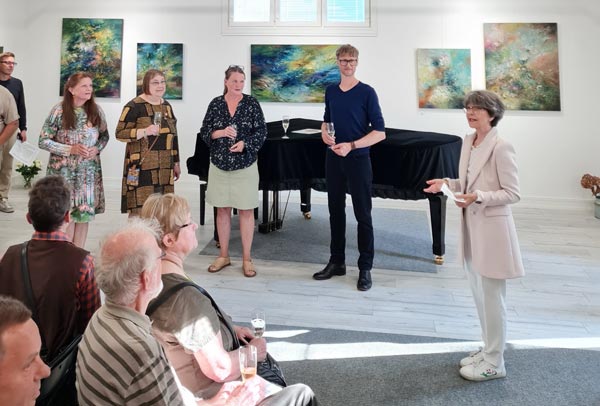
Unfortunately, I don’t have photos of the other artists’ pieces, but do visit these websites to see their work:
It is an honor to be in the company of these artists!
I had a good time in the opening meeting new people who like this kind of art that has a connection to art history.
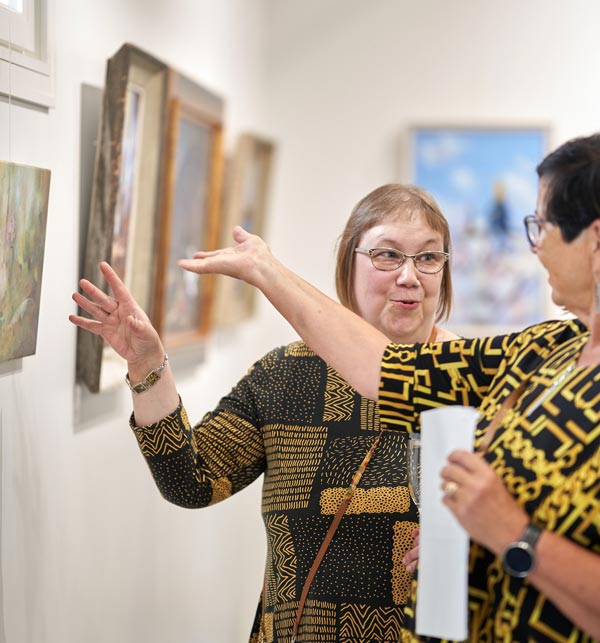
After working on the paintings alone for a long time, it’s so nice to hear what others see in them and tell about the creation process that started early this year.
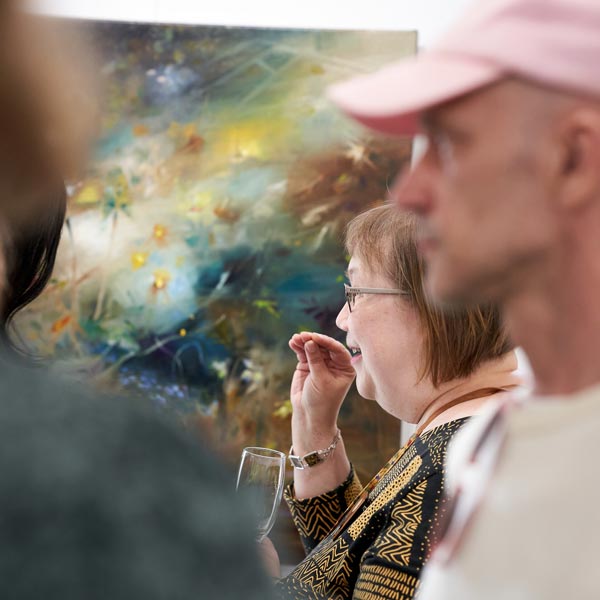
My paintings were mostly from this year, but there were some from the last year. I think it is a cohesive collection and as a whole, maybe best what I have presented so far.
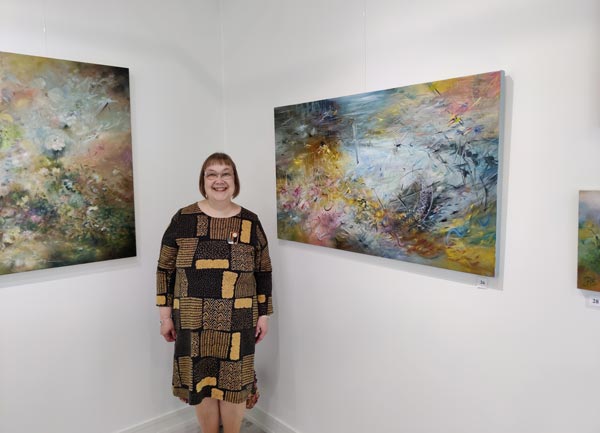
The exhibition continues until October 1st, so if you are in Finland this fall, do visit the Albert Edelfelt Studio Museum Villa Albert!
P.S. See the previous posts to see the paintings more closely. I still have a couple of pieces to show you, and now I feel the urge to draw, so more art to come in the next weeks as well!
Kaunosielu – Painting and Drawing Sensitivity
Kaunosielu is a Finnish word for which I don’t know an English equivalent. It means a dreamer who loves beauty, but the word has an ironic undertone. This romantic soul, alienated from everyday life, cares little about taking care of practical matters and frequently stops to admire the beauty around her.
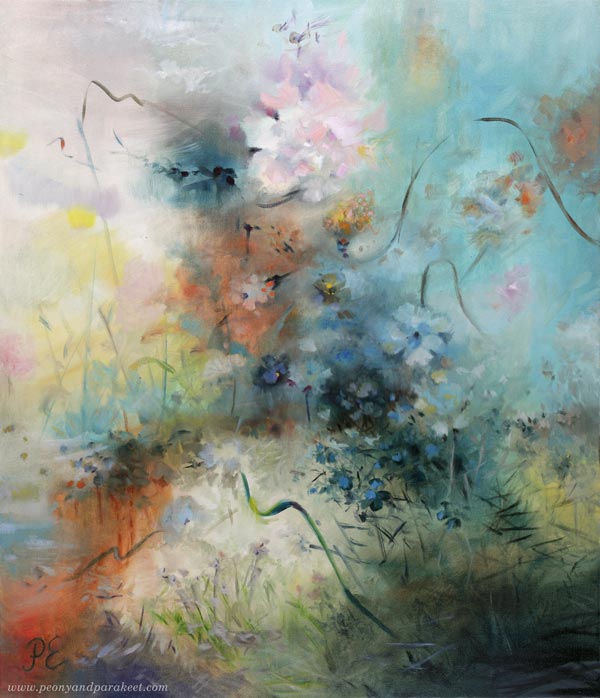
I’ve been thinking about people’s yards in my neighborhood a lot lately. The new houses have a small lawn area, a wooden patio, and a row of white cedars. These homes are advertised as “easy-to-maintain yards” in real estate ads. And yet, it often happens that when time passes, a few violets or a peony bush appear. It makes me believe that we all are “kaunosielu people” who have a sensitive heart and eye for beauty.
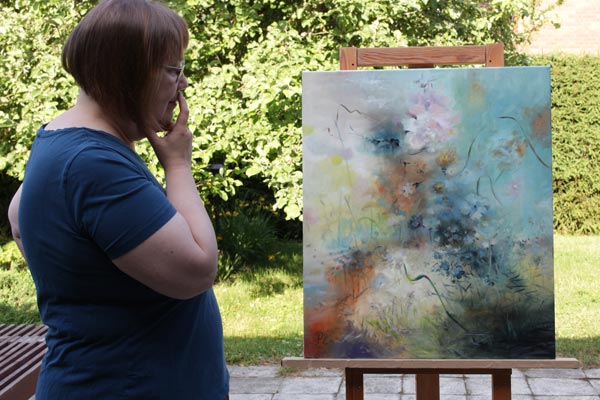
So my Kaunosielu painting is dedicated to that part of you who stops after seeing something beautiful. This topic was challenging for me because I usually express movement. Here, however, it’s all about staying rather than leaving and looking rather than running away.
Inspiration from Pastel Drawings
I am making a series of paintings for an exhibition called “In the Mood of Albert Edelfelt” and I have browsed a lot of Albert Edelfelt’s (1854-1905) works. Surprisingly, his pastel drawings fascinate me the most. Look at this woman, for example – or rather – her dress!
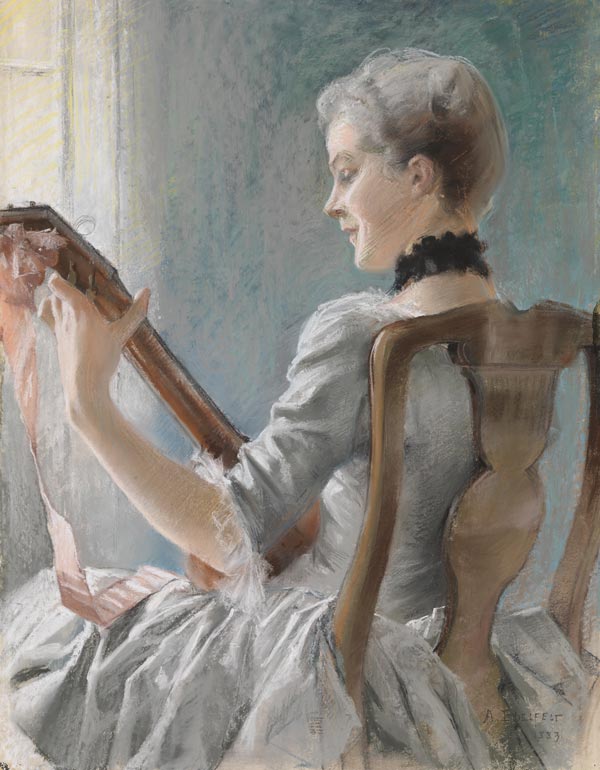
I see a similarity with flowers in old portraits. The outfits are pleated like the petals of flowers and the lines form interesting patterns.
I also started using chalk brushes in the ProCreate app. Here is a digital pastel drawing: peonies and strawberries.
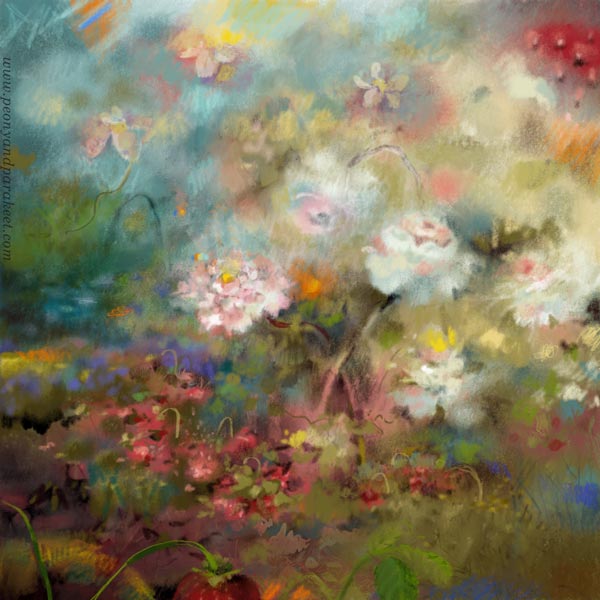
I have done oil pastel work for the course Innovative Portraits, but now I dug out the soft pastels.
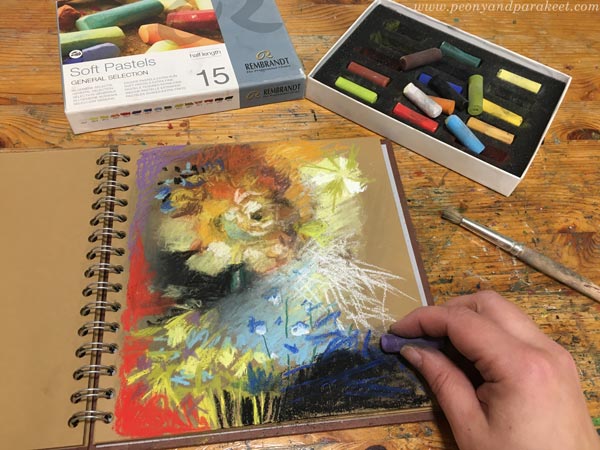
Soft pastels are more chalky than oil pastels and maybe a bit more difficult too because, unlike oil pastels, soft pastels also need fixative.
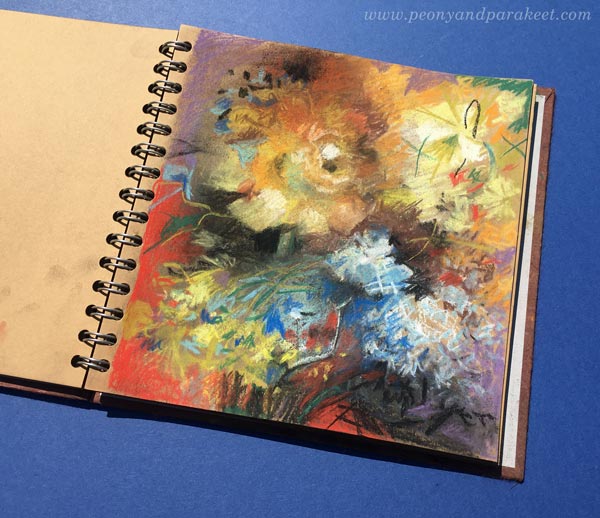
This is just a small notebook and a small piece but I like to practice between bigger paintings.
Kaunosielu on Canvas
My painting Kaunosielu is painted in oil, but it is close to pastel artworks in terms of color scheme and the use of lines.
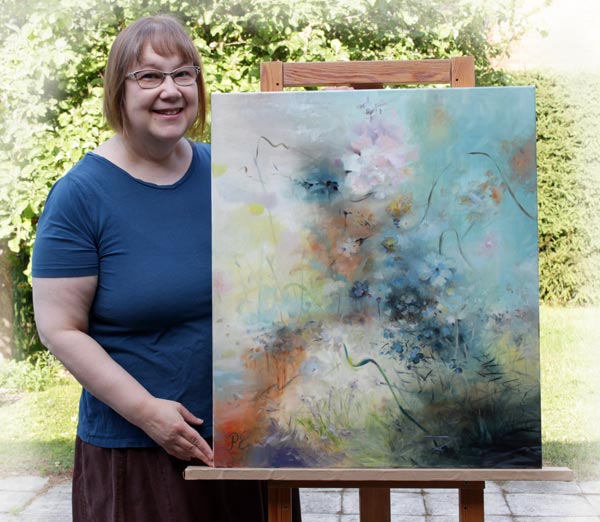
The painting is inspired by a lovely pastel drawing by Albert Edelfelt called “At the Window.” I was lucky enough to see this work authentically in the Albert Edelt exhibition of the Ateneum Art Museum. This piece is 68 x 62 cm, so it’s quite large for a work drawn on paper. And look at that frame!
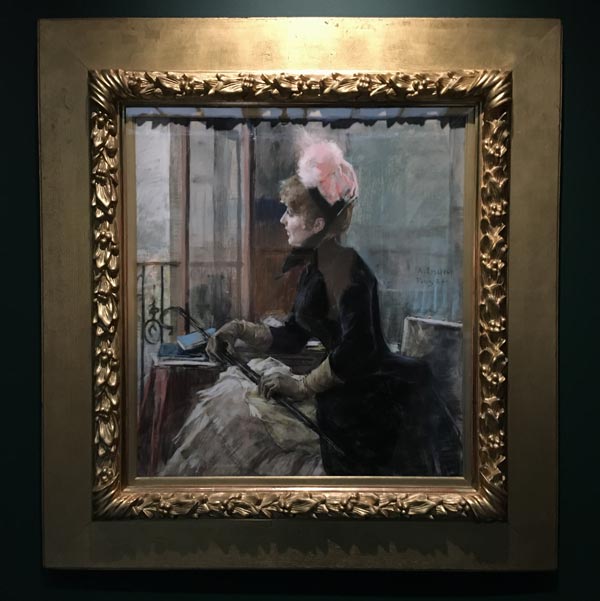
I was especially fascinated by the composition, and as soon as I started my painting, I felt that now it was coming: Kaunosielu! I had been planning to do a piece called that for a long time.
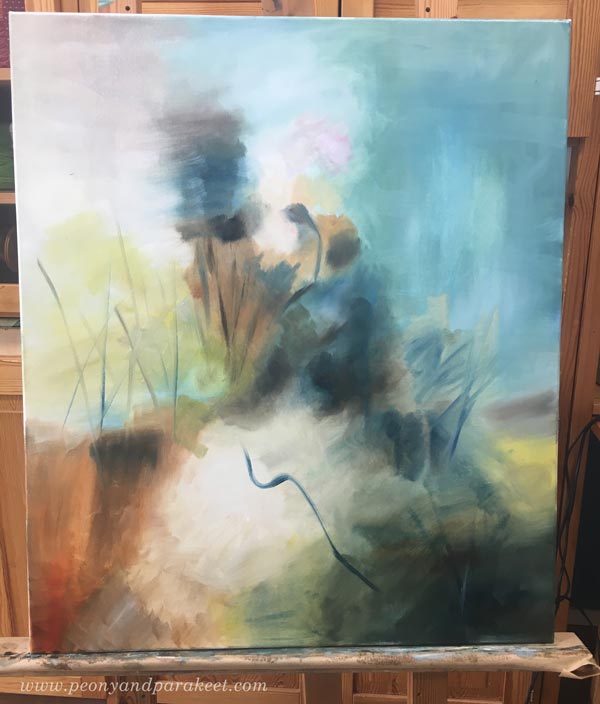
I wanted to incorporate haziness and vagueness into this painting, but at the same time use strong variations in darkness. With the big differences in color value, I wanted to create a sense of presence similar to Albert Edelfelt’s paintings.
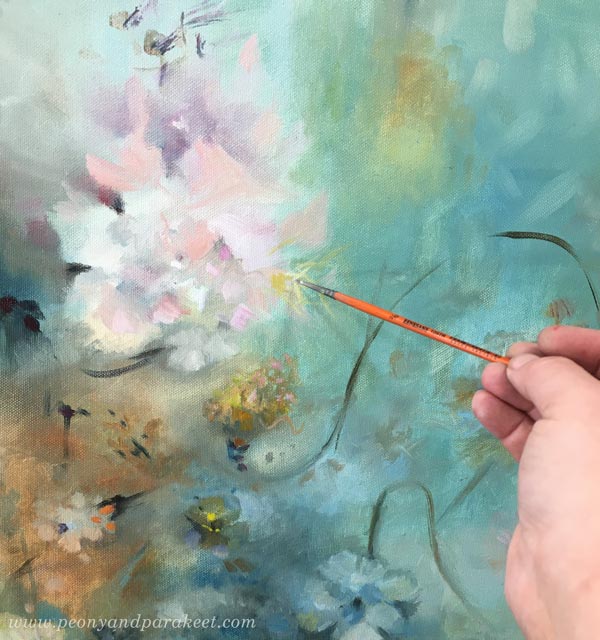
When I took this photo in the morning sun, it felt like the moment stopped and two Kaunosielus came into the picture.
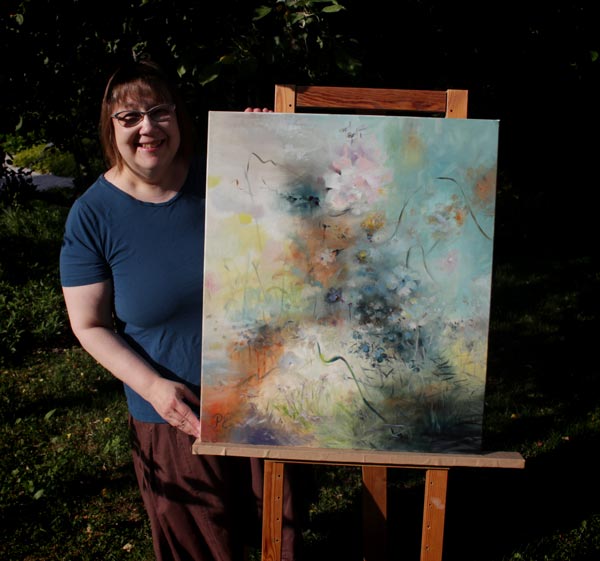
This photo shows so well how darkness and light go hand in hand.
This Week’s Challenges for Your Art-Making
- Empathize with the kaunosielu personality: Examine what it means to be an impractical but sensitive sielu – soul!
- Examine old portrait paintings. Dind the similarities between flowers and luxurious dresses.
- Be bolder with contrasts. Enhance your expression by combining pastel colors with really dark blues and browns.
- Experiment with soft pastels or oil pastels or mimic their effects with other art supplies.
I hope all these tips inspire you to start creating!